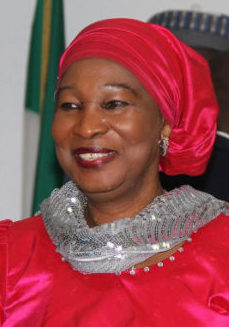
I feel highly honoured and privileged to review Khuraira Musa’s all-inspiring account of a life’s journey from birth to a glorious position of international fame. The 8 chapters of the book are structured in such a way that a sequential logic is succinctly manifest from the prologue to the epilogue, as readers appreciate the journey step by step. The writing skills of the author portends a compelling and enjoyable reading. Believe you me, if you start reading, you will not want to stop. The Book is not too long nor too short. It is just right, taking away boredom and enthusing suspense. After reading through the book, there is this nagging feeling that keeps one asking questions about one’s personal life’s journey. The life lessons in the book are weighty.
I will review the book by [a] reassessing our understanding of poverty through the early childhood experiences of the author; [b] the tenacity of the author manifested in her ability to go to school, stay in school and Complete school within an adverse context; [d] understand the social cultural relations between cattle fulanis and farmer communities; [e] gain insights into the bountiful capacity of Khuraira to remain determined, focused, tenacious and successful given the odds stacked for her in a new land; and [f] draw lessons from Khuraira on managing family and work and managing personal tragedies while remaining strong.
Reassessing Poverty Indicators: we have been taught that poverty is living on less a dollar per day. Poverty means very low HDI calculated from one’s access to basic amenities such as access to water/sanitation, electricity, basic health care, minimum nutritional food intake and housing. That being the case, it may be right that over a million Nigerians are poor. However, reading about life in the Ruga, and my experience growing up and visiting relatives in rural areas and relatives who are basically farmers, I would restate that we are not poor. Though my father was a headmaster of primary school in rural villages when I was born, we had all we needed.
There was also happiness probably coming from the free environment, large private spaces and lack of want. Absence of TV and Electricity meant that quality family time was always respected with storytelling, at times singing and dancing. Were we then poor? I say no. The Ruga lends a similar experience. Even though we did not have a dollar per day, we consumed much more than a dollar per day. Things were different when one moved to the town. Renting houses and going to the market every other day to buy food stuffs that used to be in our barns was a different experience.
The Ruga settlements are largely cattle Fulanis. They were not far from farming communities. As said earlier, I also lived in rural areas in my first 8 years. We had farms behind our house. We were friends with the Fulanis. They brought milk regularly to our house. There was never a time one heard of cattle destroying farms. What we guarded heavily against were monkeys and baboons venturing in and eating some of the produce. We kept effigies like humans to scare them away. So what has gone wrong? Khuraira’s suggestion that expansion of urban settlements due to population explosion might have been edging out the Cattle Herders to the extent that they started resisting could be a consideration. Another consideration is the infiltration of the Fulanis by insurgents and bandits from within and from neighbouring countries. These elements might have corrupted the Fulanis who we used to know as friends and helpers when we were growing up.
Education was absolutely free. We were given books and uniforms for free. That was up to my secondary school. However, those that attended missionary schools like Khuraira, paid small fees and paid for the books and uniform. When we attended university, the State Scholarship Board paid our tuition fees and living expenses. The only expense my father paid for was transport money and snacks like chin chin that we used to make. Life is very different today. We need to understand properly what went wrong with our public schools and come up with solutions quickly so that quality education options are available to the less privileged. Education policy in Nigeria is not lacking. What may be lacking is adequate application of funds to turn around the public education system. We also need more input from philantrophists. The Zainab Memorial School lends a solution. With 175 children currently enrolled and enjoying qualitative free education, all I can say is amazing.
We need to repair our public schools. I have been to public primary/secondary schools in rural areas from 2017. There is a school in my locality that had over a thousand students. There was no functioning library, many classrooms are still in a state of disrepair, majority of the students cannot buy the text books and exercise books. Just as Khuraira, I asked myself how I could help. I supplied some exercise books, basic school bags and later textbooks through grants. My foundation also upgraded 10 secondary school libraries with grants from UBEC and others. But these are one off interventions. The Zainab Memorial School is a huge sustained investment that impact on the lives of many on a sustainable basis. We pray the Almighty Allah will bless the effort of Khuraira and her associates for giving back to society at this huge level. I pray that many more such courageous interventions will continue to come. I call on all of us here today to ask what we can individually do to uplift public schools in our rural villages. A lot can be achieved you will be surprised.
Girl Child education in particular has been a subject of interest to government right from the early 1990s. State Governments came up with policies enforcing girl child education and restricting early Marriage. I remember in the early 1990s, the wife of Military Governor of Borno State championed the cause of girl child education and campaigned against early marriage. The Domestication of the Child’s Rights Act in many states of Nigeria is also good news. We have made some progress, but more needs to be done. I was elated reading that Khuraira was not denied education because she had compassionate and forward looking parents and her stubbornness to do the difficult at that time – go to school – paid off and made her what she is today. What impressed me most was that even after marriage, she furthered her education up to degree level. Not all girls had this acute focus and sense of direction that Khuraira had and still has. Not all girls were fortunate to have outward looking and forward looking parents. Most girls in the Rugas and some rural settlements up till today will be lucky to attend primary school and fewer still, secondary school. We need to revive the campaign for girl child education. I call on our National and State First Ladies to please pick up this important campaign once more. The disruption caused by insurgency and banditry to education is deep and would take years to mend. We need to fast track the process.
If I tell you that despite my staying abroad for my post graduate degrees and being a professor and one-time Director General of a new Institution, I feel lame reading how Khuraira created a niche for herself in a highly competitive world of cosmetics industry. It is difficult for most to develop the self-confidence and skills that would make one excel. To be a perfect fit early in a competitive work environment requires wisdom, tenacity, natural brilliance and social skills. The great opportunity that opened to Khuraira in Henri Bendel in New York was a result of a record of excellence she had already built in California where she excelled in marketing and product experimentation. She had an excellent portfolio from her work on Lacome product lines. To quickly transcend from being an employee at Henri Bendel, and later Laura Mercier, top rank cosmetic outlets, to an employer in an already saturated market and succeeded, required endowment from the Almighty Allah, brilliance, innovativeness, capacity to take and manage risks and transformative leadership skills. The Dark Circle Complex Primer and the Invisible Powder were innovations that had no match in the market. The products were a signature of the newly established Khuraira Cosmetics. That is why icons like Oprah Winfery (Harpo Production) was one of the clients of Khuraira Cosmetics. Khuraira Cosmetics became a known and successful brand in many countries including Nigeria. Nigeria’s First Lady, H.E Aisha Buhari, has been a client of Khuraira Cosmetics. I am proud that our dear Khuraira from the Ruga, is our Einstein. I salute your courage and doggedness. Your life’s journey is a book that whoever reads, must not be the same again. There are takeaways from each chapter, if utilized effectively, would lead to the transformation of one’s capacity to excel in life. This book should be in libraries in secondary and tertiary schools. It’s like a novel everyone must read, boys and girls.
Reading through the Chapters of the Book, I was smitten by Khuraira’s personal challenges. While her son, Hanif nearly died of sickle cell anemia, I was amazed that he was cured of the genetic disease completely through Bone Marrow Transplant. The wonders of the advancement of Medical Sciences are a daily reality that avoided most African Countries, Nigeria inclusive. It is our fervent hope that even if one country cannot build a medical center of excellence that has the capacity to attract medical tourism, the Authority of Heads of Government of ECOWAS should consider pulling resources to erect a state of the art hospital that can compete with Saudi German Hospital in Dubai, or top rank hospitals in India, that we can call our own. We encourage Dangote, Abdusamad and Tony Elumelu to invest in building such hospitals at a private level or in partnership with government.
The Death of Khuraira’s husband was a huge personal tragedy. He was her friend, business partner, her love, and father of her children. But the bright light surrounding this darkness in her life is that she is determined to forge ahead, reinvent her business while holding on to dear memories.
Khuraira raised well-mannered and accomplished children that are achievers in their own right. They are with her, comforting her and helping her. They are an asset to her. This a huge blessing from Allah to which she should be daily thankful. The death of her mother (Auntie Zainab) at old age was a moment of despair, but nonetheless, her memorialization in the Zainab Memorial School means her life is being celebrated. Khuraira is thankful to the Almighty Allah to kept Auntie Zainab that long to have witnessed all her accomplishments. She must have died a happy and well accomplished mother.
The last section of the book listed some of the partners of Khuraira that one way or the contributed to her success in life and gave her stability during bad patches in her life. The lesson learnt here, is that progress cannot be achieved that far and that quickly without a network of well-endowed friends and partners with lots to offer, in friendship, goodwill, ideas and at times labour and resources. We all need such a network that will lift us up and not the ones that will pull us down. May the almighty Allah distance us from those that will pull us down.
As I said, ‘The Audacity of An African Girl’ is a must read for all. When reading, let us focus on the life lessons in the pages. May this book transform the lives of readers to attain the optimum good. Amen.
Mrs Hamalai, Jakadiya Mubi Emirate, is a former Director-General of the National Institute for Legislative and Democratic Studies.



